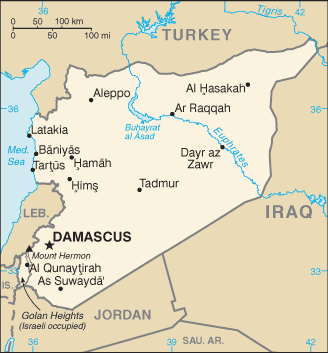The calls for intervening more directly in the Syrian conflict continue to make headlines. But the reasons to stay out of it – ranging from the strategic and logistical to the legal and moral – are as numerous as the options for intervention.
A recent Op-Ed from researchers at the RAND Corp. argues that “the US needs a more activist, assertive policy toward Syria.” Since the target audience for these policy recommendations are not emotional, ill-informed voters, all pretense of “humanitarian intervention” is  dropped. Nay, the United States should undertake to shape the outcome of the conflict in Syria because it has “significant geostrategic implications” that effect “the nature and stability of the future political order in the Middle East.” Plus, the authors remind us, “Assad’s overthrow would be a major strategic defeat for Iran.” Picking winners and losers in Syria, they promise, will increase Washington’s chances of “influenc[ing] the post-Assad transition” for America’s own interests.
dropped. Nay, the United States should undertake to shape the outcome of the conflict in Syria because it has “significant geostrategic implications” that effect “the nature and stability of the future political order in the Middle East.” Plus, the authors remind us, “Assad’s overthrow would be a major strategic defeat for Iran.” Picking winners and losers in Syria, they promise, will increase Washington’s chances of “influenc[ing] the post-Assad transition” for America’s own interests.
They say our policy should basically expand on what the Obama administration is already doing. That is, aiding the opposition:
- The US should provide opposition forces with increased intelligence and communication equipment, thereby enabling them to coordinate their attacks more effectively.
- The US should supply arms, ammunition, and logistical support to the opposition, beyond what Saudi Arabia and Qatar currently are providing. Additional weapons — including anti-tank guided missiles, mortars, and sniper rifles — would enable the opposition to launch effective attacks from a distance, and challenge the pro-Assad forces’ air supremacy.
- America and its key allies should help to train the opposition forces to operate these weapons. The training provided by France, Britain, Qatar, and the United Arab Emirates played a critical role last year in shifting the balance in favor of Libyan opposition forces, and it could have a similar impact in Syria.
The authors choose to completely ignore the unscrupulous nature of the opposition fighters, the crimes they have committed and their growing ties to al-Qaeda. And as I discussed here, US-funded proxy wars that grow out of civil conflicts are simply not associated with “regional stability” or “peaceful democratic transition[s]” (See Nicaragua, Afghanistan, Guatemala, Vietnam, Angola, etc.), as the authors claim to envision. And as Prof. Eva Bellin and Prof. Peter Krause in the Middle East Brief from Brandeis University found in their study of the Syria situation, “The distillation of historical experience with civil war and insurgency, along with a sober reckoning of conditions on the ground in Syria, make clear that limited intervention of this sort will not serve the moral impulse that animates it. To the contrary, it is more likely to amplify the harm that it seeks to eliminate by prolonging a hurting stalemate.”
Beyond the fact that the interventionists seem interested in neither humanitarianism or historical experience, the impulse to interfere and help impose regime change in Syria bears a greater hubris. That is, who are these policy wonks, politicians, and pundits to presume that they know best how to solve the Syrian conflict toward any end, never mind their nefarious ones? Who are these geniuses insisting on utilizing their omniscience to shape the crisis?
 The Austrian economist Friedrich Hayek labeled this indefatigable arrogance in the economic realm a “Fatal Conceit,” arguing that “the knowledge of the circumstances of which we must make use never exists in concentrated or integrated form but solely as the dispersed bits of incomplete and frequently contradictory knowledge which all the separate individuals possess.” Or, as Ralph R. Reiland summarized it, “the flawed concept…that one man or one group, one cabinet of commanding officials or one central committee, or one team of planners from Harvard and Yale, can gather and understand enough information in order to reshape the world around them according to their wishes, reshape human nature, and design” their own outcome.
The Austrian economist Friedrich Hayek labeled this indefatigable arrogance in the economic realm a “Fatal Conceit,” arguing that “the knowledge of the circumstances of which we must make use never exists in concentrated or integrated form but solely as the dispersed bits of incomplete and frequently contradictory knowledge which all the separate individuals possess.” Or, as Ralph R. Reiland summarized it, “the flawed concept…that one man or one group, one cabinet of commanding officials or one central committee, or one team of planners from Harvard and Yale, can gather and understand enough information in order to reshape the world around them according to their wishes, reshape human nature, and design” their own outcome.
The fatal conceit of the crafters of foreign policy is that, with their limited knowledge and nearly unlimited power, they can play marionette and pull the strings of the entire Middle East to shape it in their own cruel fashion, without adverse consequences. The history of misbegotten foreign policy schemes in Iraq and Afghanistan, and the covert interventions preceding them that brought so much initial blowback, are enough to prove they still don’t know what they’re talking about in the case of Syria.


